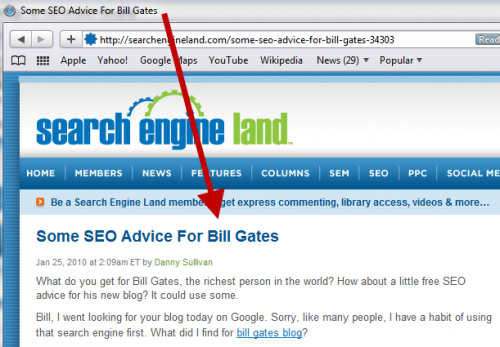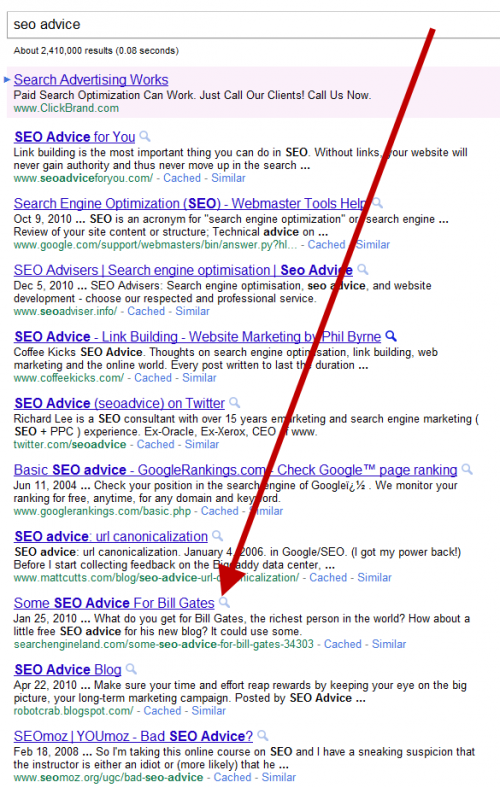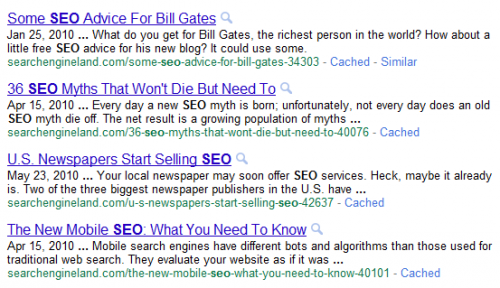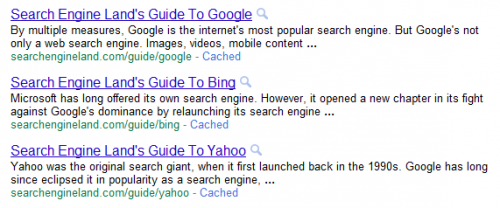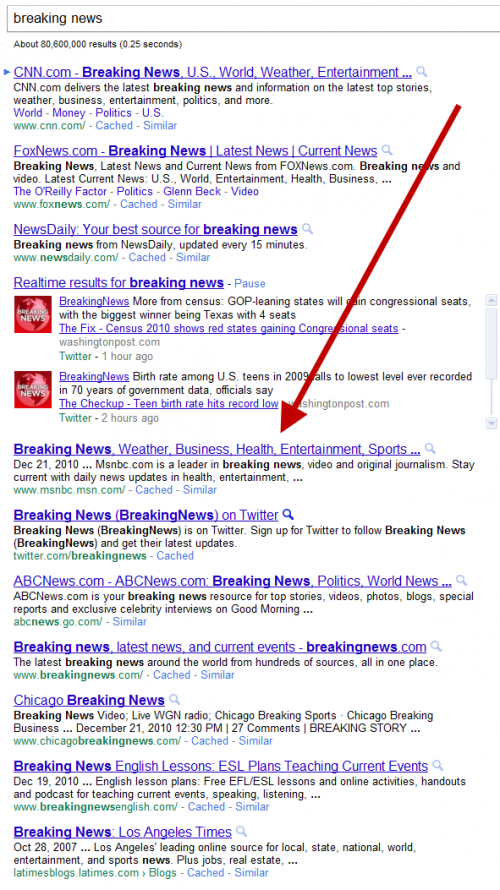Writing HTML Title Tags For Humans, Google & Bing
I generally enjoy John Gruber’s writings, but today he’s dishing out SEO advice about HTML title tags. Some of it is bad advice. So with respect, here’s how I’d suggest you write page titles in a way that can please search engines and humans alike. What Is An HTML Title Tag? Let me go back […]
I generally enjoy John Gruber’s writings, but today he’s dishing out SEO advice about HTML title tags. Some of it is bad advice. So with respect, here’s how I’d suggest you write page titles in a way that can please search engines and humans alike.
What Is An HTML Title Tag?
Let me go back to the basics. The title tag is a section of HTML code that every page should have. It declares what the page’s title is.
For example, here’s the title tag for the Search Engine Land article I wrote earlier this year, Some SEO Advice For Bill Gates:

The <TITLE> tag appears within the <HEAD> section of a web page. Other content may also appear in the header area, including meta description tags, the canonical tag, special tags for Facebook and much more. In my example above, I’ve eliminated much of what’s in the head area so that we can focus on the title tag.
How Is An HTML Title Tag Used?
Every page can have an HTML title tag, but how that tag is used can vary. Most browsers will show the title in the reverse bar at the top of the browser window. Below, I’ve showed how that “Some SEO Advice For Bill Gates” article that I mentioned appears in Internet Explorer, Safari and Firefox:
Chrome is also shown in the illustration above. Rather than use the title in the reverse bar, Chrome uses it at the top of the “tab” for each page it displays. The others also do this in addition to using the title at the top of the browser window overall.
Title Tags Versus Headlines
The HTML title tag is often used by many blogging systems and other content management software as the main headline for a web page. Again, here’s that page I used as an example:
You can see how the HTML title tag is also being used as the main headline on the page.
This is common, but it is not required. For example, here’s a recent New York Times article that attracted much attention about a merchant who believed that being mean to customers was helping him rank better on Google:
Notice how the title tag, which is used at the top of the browser window, is different from the main text on the page.
Title Tags For Bookmarking
When you bookmark or make a page a favorite in your browser, the title of the page will be suggested as name of the bookmark (generally, you can edit the page name before saving). Here are the two articles I’ve mentioned above, as bookmarked in Firefox:
The title tag will often be suggested as the text used to record a page with social sharing sites, such as Delicious:
Here’s another example at Digg:
Title Tags As Displayed By Search Engines
Search engines make use of title tags in two ways: for display purposes and for ranking purposes. In John Gruber’s article today, Title Junk, he gets upset about title tags that produce a bad display or readability situation. He’s correct, on some fronts. He also suggests that title tags play no role in ranking. He’s dead wrong, in that regard.
Let’s talk about display first. Below is a search on Google for seo advice:
You can see my article listed. The headline of the listing matches the page’s HTML title tag. In most cases, the listing will do this. Not always.
When Google Ignores Your Title Tag
In some relatively rare cases, Google will make use of the Open Directory’s headline for a page. Similarly, if a page lacks a title tag, Google may create a listing title by looking at common text used to link to that page. Additionally, Google sometimes decides to craft a listing’s title by combining text from a title tag, text from links, text from the page, the domain name or other methods that it decides is best.
As a site owner, I hate this. I want Google to use whatever page title I give it. Google argues back that it has to be creative, especially in cases where people have failed to provide titles. I’ve argued in the past that as a solution, Google should provide site owners with some type of “yes, I’m really really sure” meta tag to declare that they absolutely want their pages titles to be used. I’ve not won that argument. But, at least, Google will obey the NOODP meta tag and not use Open Directory titles, if you object to that.
Good Titles Versus Too Many Keywords
One of the things Gruber is upset with are titles that seem “sloppy” or filled with “junk.” Perhaps the best example of overload is MSNBC, which has this title tag:
Breaking News, Weather, Business, Health, Entertainment, Sports, Politics, Travel, Science, Technology, Local, US & World News – msnbc.com
Gruber writes:
Who are these title-junk keywords aimed at? Google? Do you they really think that putting “breaking news” in their home page title makes it more likely that Google will rank them higher when people search for that term? It’s like they’re taking advice out of an SEO book from 1995.
I’ve actually been doing SEO since 1995 and writing advice about it since 1996. I can tell you that my advice from back then wasn’t to shove in a billion keywords like this. From April 1996:
Focus on the two or three keywords that you think are most crucial to your site, then ensure those words are both in your title and mentioned early on your web page.
So I agree. I think MSBC is overdoing it. It has 12 different news topics that the home page’s title tag is targeted. Really, it should focus on only two or three topics. But I’ll get back to this more when I talk about ranking issues.
How long is too long? Google and Bing don’t really care. If you have a long title, they’ll simply truncate the excess, like they do in this case for a search on breaking news, which brings up MSNBC:
Some, like Gruber, may feel having a title cut short like this is ugly. Some searchers might not care. I’ve never seen studies that say one way or the other. Personally, I’d prefer titles that fit. But ultimately, I’m not writing my own titles to precisely fit within the space that Google and Bing will display (about 70 characters at both places).
Site Name In The Title Or Not?
Gruber also offers suggestions on what he views as the only sensible formula for creating page titles. These are to show:
- Name Of Site –Headline
- Headline — Name Of Site
I’ll provide an simpler formula:
- Show what you think is important to your potential reader
Do you think that your readers need to know the name of your site on each and every page? I don’t. Not for my site. That’s why we don’t put Search Engine Land into the title of all of our articles.
For example, here’s a search on Google for pages from Search Engine Land about SEO. Most of these are articles, features and columns that we’ve written. None of those types of pages carry our site name in the title tag:
Search Engine Land has what I believe to be a good brand in the search marketing space. I suppose putting our name in the title of each article might further resonate with those who do a search at Google and know our brand. However, I also know that people will also look at the entire listing, and the name of our site is included in our URL.
More important, I expect many people who search for the content we provide do NOT know our brand. They’re new to search marketing, and I think a short, focused title will be more likely to attract them to visit. So, in our case, we leave off our site name.
That’s not in every case. For example, we have a number of guides about popular search topics. In those cases, we deliberately want our brand to be known, so we include that in the page title:
Over at the New York Times, that publication clearly feels having its brand in the title is important, which is why you see it in its titles, tucked at the end:
In the last listing, “NYTimes.com” is in the title. It just doesn’t show, because it’s at the end, and the title gets cut off.
Ultimately, You Decide What’s Best About Titles
What exactly you put into your title ultimately depends on what you decide is best — not what I personally think is best, not what John Gruber personally thinks is best. No one will know your site and your visitors better than you (assuming you’re a diligent publisher). Advice can be good, but advice from afar can also lack specific insight.
Going back to Gruber’s advice, the idea of some type of template that you use for most of your pages does make sense. Do you want your site to be listed in the title or not? Make a deliberate decision about that. List it first or last? There have been debates on what’s best in this regard (or even if it’s required) that go back for years. There’s no definitive answer.
I will suggest that when it comes to home pages, they’re special. If you’re a known brand, in a space where there may be brand confusion, especially consider adding the word “official” to your title tag. Yes, others could pretend to be official as well. But they usually don’t, and you’ll usually come first.
While adding “official” doesn’t make sense for every page, it does make sense that every home page should be focused around one to three key terms that you hope the entire web site will be found for. Your most important terms. They go in your title. They do help with ranking. Leaving them out is like handing out a blank business card.
Yes, Virginia, Title Tags Do Help With Rankings
I’ve been writing about SEO for nearly 15 years now. I’ve moderated around 50 “Ask The Search Engine” sessions at conferences with reps from the major search engines. Consistently, from SEOs and search reps alike, title tags are consistently said to and found to have a ranking impact, when this question comes up.
For example, keyword in title tags were found to be the fourth most important SEO factor in SEOmoz’s ranking factors survey in 2009. Google has written about the importance of titles on its Webmaster Central Blog. Google also offers an SEO Starter Guide. I’ll get back to more advice from it in a moment — as well as a link to it — but the guide says:
A title tag tells both users and search engines what the topic of a particular page is.
The tag tells users about the topic from a display perspective. It tells search engines from a relevancy ranking perspective. A descriptive title helps the search engine know what the page is about, which in turn can help the page rank for the key terms in the title.
The title tag is not the only thing Google uses. It quite famously has over 200 signals that it contemplates. Bing similarly has a complicated recipe or “algorithm” that it uses to analyze which pages should rank tops. Yes, pages will rank well even if the key terms are not in their titles. But having key terms within a page title can help, and it is recommended as a good SEO practice.
Getting Focused
Going back to MSNBC, a good SEO practice would mean breaking its title tag down to the most important topics, maybe:
Breaking News, Politics, Sports & More From MSNBC.com
If MSNBC wants to be found for other topics like “weather” or “business,” it has other pages within the site that can do the heavy lifting for those topics.
Then again, while Gruber might not like how MSNBC’s long title looks and makes an assumption that having “breaking news” in the title doesn’t help MSNBC rank, the site IS showing up for that term:
In fact, EVERY page in the top results for breaking news makes use of those words in their page titles.
Of course, you could argue that it’s natural that the most relevant sites for breaking news would use those words in their page titles. If they suddenly dropped those words, maybe they’d retain their ranking. Maybe. Or maybe not. But when Google — and Bing — and scores of SEOs tell you that title tags matter, why on earth wouldn’t you create a short, descriptive title for your home page that encompasses what it’s about?
If Books Get Good Titles…
So when Gruber writes:
Surely, the name of the site should be the first thing (and in many cases, the only thing) in the title of the home page.
I have to disagree. It’s like saying that the title of a book should only be the author’s name. A web site is like a book. It deserves a good title, just like a good book does.
By the way, while I’d agree that MSNBC might want to trim its title to be more specific — which could then include having its brand showing — consider this search for MSNBC itself:
Notice the title is “msnbc.com” — but this is the exact same home page that has that long title before. What’s up? This is one of those cases where Google is trying to do the right thing. I searched for MSNBC. Google has changed the title that it shows for the page, probably using patterns of how people link to it, to present a title that Google believes is most relevant.
Some Closing Advice
Goodness knows there are plenty of people who dismiss everything about SEO as junk. SEO is not junk, and people who continue to have that type of knee-jerk reaction are simply ignorant of how search engines work.
If someone cannot distinguish between spam and SEO, if they cannot distinguish between good SEO practices and going overboard, if they write off all of SEO off as nonsense, my advice is to safely ignore anything they have to say. They are effectively web bigots, and you should treat their advice as you would the rantings of any bigot.
I don’t get the impression that Gruber is such a bigot. I think he understands there are good SEO practices and is justifiably upset at some excesses. As I said, I agree with much of that.
However, writing off the importance of title tags period is bad advice. That takes me back to that SEO starter guide from Google (PDF format & the image at the top of this article comes from it). It’s from Google! Unless you buy into a conspiracy that Google is deliberately trying to mislead publishers about the importance of title tags, I think it’s good advice to follow. Here’s what the guide has to say about title tags:
Accurately describe the page’s content
Choose a title that effectively communicates the topic of the page’s content.
Avoid:
- choosing a title that has no relation to the content on the page
- using default or vague titles like “Untitled” or “New Page 1”
Create unique title tags for each page
Each of your pages should ideally have a unique title tag, which helps Google know how the page is distinct from the others on your site. using a single title tag across all of your site’s pages or a large group of pages
Avoid:
- using a single title tag across all of your site’s pages or a large group of pages
Use brief, but descriptive titles
Titles can be both short and informative. If the title is too long, Google will show only a portion of it in the search result.
Avoid:
- using extremely lengthy titles that are unhelpful to users
- stuffing unneeded keywords in your title tags
It’s basically what Gruber wants — short titles that are relevant to the page. No disagreement there. But if you want to “trust the Googlebot to figure it out,” as Gruber writes, then you should also trust that Googlebot does indeed want some help in doing that figuring. That means being descriptive, even on your home page.
Heck, if Google said “Google: The World’s Leading Search Engine” in the title tag of its home page, maybe it would finally start ranking itself for those words!
Contributing authors are invited to create content for Search Engine Land and are chosen for their expertise and contribution to the search community. Our contributors work under the oversight of the editorial staff and contributions are checked for quality and relevance to our readers. The opinions they express are their own.
Related stories
New on Search Engine Land

